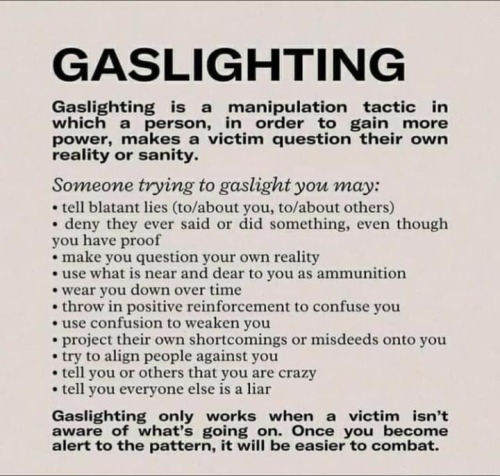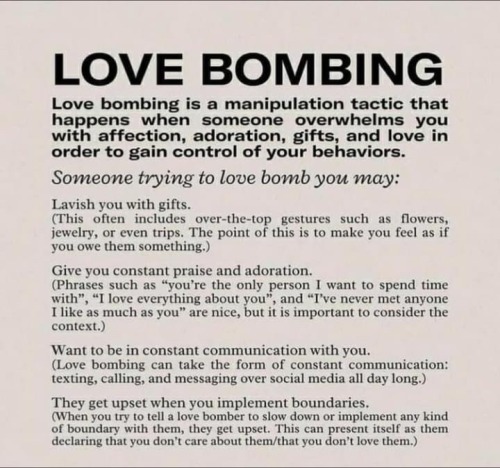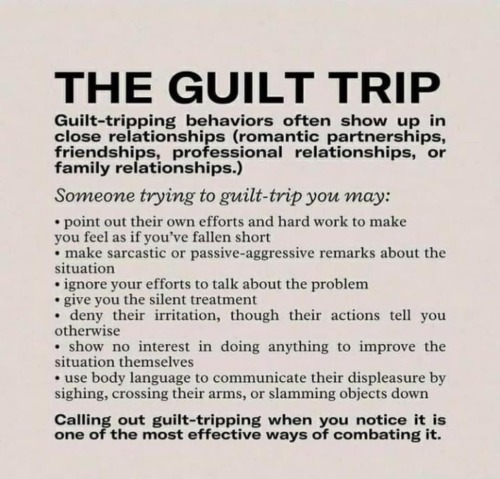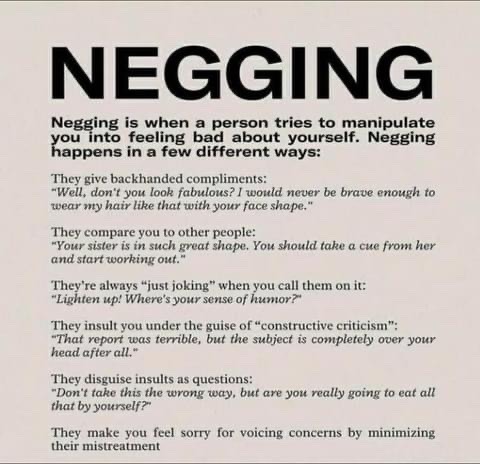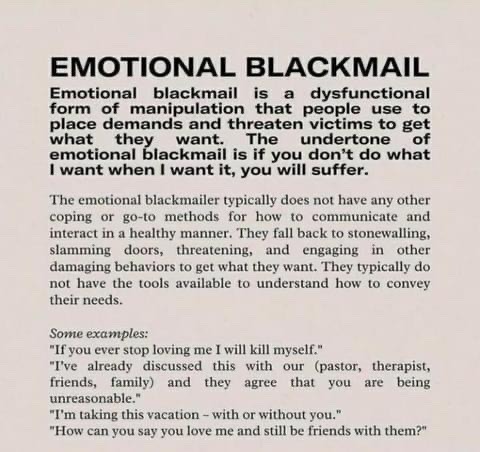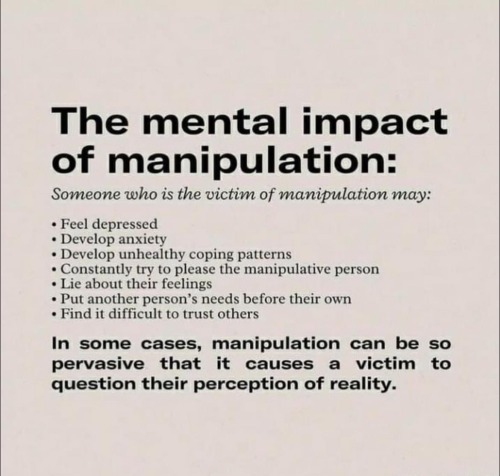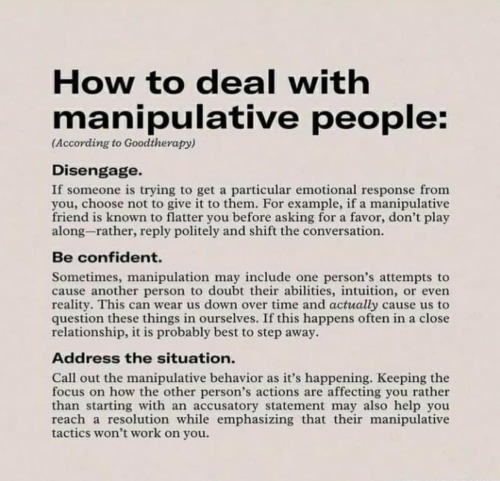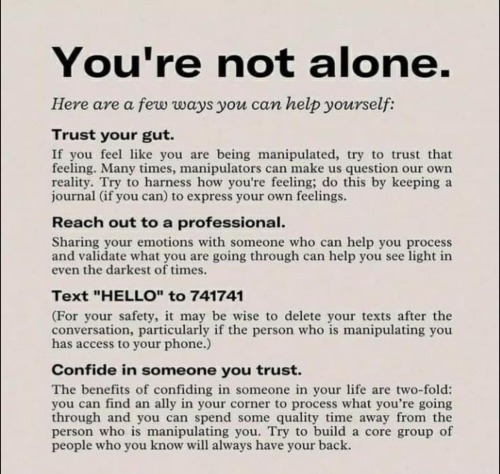No Truer Words Ever Spoken
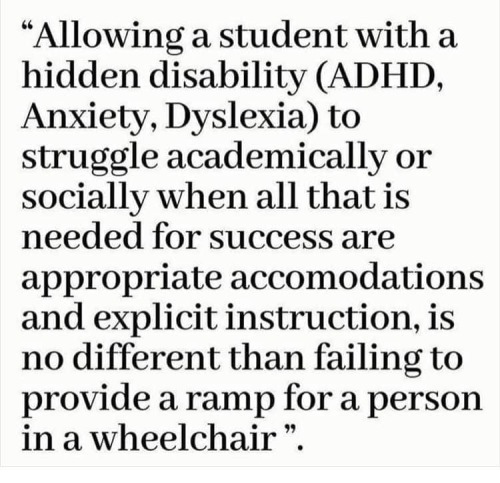
No truer words ever spoken
More Posts from Bipolaruchiha and Others




[Image description: four slides with black text on a light blue background that read as follows:
Victim blaming by abusive parents looks like… “You’re disrespecting me by having boundaries that are inconvenient to me. Therefore, I’m entitled to hurt you.” “You know I get mad when you do this and you did it anyway, so it’s your fault I hit you/yelled at you/belittled you.” “You’re hurting my feelings by accusing me of being a bad parent.” “What have I done to deserve this?” (Usually as a reaction to you establishing boundaries). “You’re tearing this family apart (by fighting back against the abuse).” “You’re a bad child. Look at all the bad things YOU’VE done to ME.” (often, those things are trauma reactions, like avoiding their presence or acting behind their backs). (When you try to hold them accountable) “Oh, I forgot, you’re always right and I’m always wrong. Nobody cares about me or my feelings. I do everything for you and this is what I get in exchange.”
In reality… Every person is responsible for their actions. You didn’t make them abuse you—they CHOSE to abuse you. You have the right to be able to establish boundaries without fear of punishment. You have the right to have your needs met. Your trauma reactions are not something you’re doing to disrespect them—they’re something your body is doing to protect you from harm. End image description]
These are just some examples of things abusers say to frame their abusive actions as the victim’s fault (taken from personal experience and the stories of people who have messaged me). Feel free to add your own examples if they’re not listed here and if you want to help spread awareness about what victim-blaming looks like!
And remember: abuse is never the victim’s fault.
What does guilt-tripping by abusive parents look like?
What does gaslighting by abusive parents look like?
I find myself explaining to people a lot recently why using "bipolar" "narcissistic" "psychopath" etc is an issue, because it can be hard to articulate in the moment, so here it is all together:
The terminology that is related to certain conditions, disorders, and neurotypes being appropriated by others to be used in commonplace situations necessarily creates problems for those whose conditions these terms are supposed to belong to and help. It stigmatises certain behaviours, makes them the butt of the joke, or underplays how debilitating they can be.
For someone who has to live with bipolar disorder, people using "bipolar" or "mania" loosely suggests that the actual bipolar people are overreacting, or else that their condition is a joke when in fact this condition not only hinders them in an ableist world, but also brings violence and discrimination against them because of the condition.
Such also is the case for personality disorders and complex disorders like schizophrenia. Using "psychotic" as an insult or a modifier erases the fact that it's a condition which most aversely affects the psychotic person, it stigmatises them as dangerous when in fact psychotic people are the ones more likely to receive violence than inflict it statistically and historically.
Saying psychopath when you mean a serial killer and sociopath when you mean someone who is cruel is also wrong in that same vein because these are ((now redundant)) subtypes of anti social personality disorder, which does not make people more likely to cause harm or to be "evil" or abusive, but rather causes issues in their own lives due to a lack of empathy, which must also not be confused with a lack of compassion.
Narcissistic personality disorder similarly is a cluster of self esteem issues, identity crisis, and a fragmented sense of self that shows itself in certain behaviours. Borderline personality disorder also is similarly stigmatised, when in fact people with this disorder are far more likely to be victims of abuse. Terms like "narcissistic abuse" or "borderline abuse" suggest that these people abused you because of their disorder, which is not at all true, and any idea of abuse can already be encompassed simply by calling it "abuse" plain and simple rather than stigmatizing a bunch of people in the process of this.
All of these disorders, though not curable, still are treatable in that people are trying to get help and adjust to life despite their symptoms. This only becomes possible as long as these symptoms and terminologies are not stigmatized any further by an ableist society. The terms used to describe these disorders are meant to HELP the people with those disorders. Not to become an excuse to treat these people worse and make them feel unwelcome.
Simone Biles saying “Mental health is more important than sports” on the biggest platform she could have possibly done it from is why she’s incredible, actually
i talk a lot of shit for someone who has to take 6 pills a day so they dont blow their brains out
reminders for dealing with intrusive thoughts:
you are not your intrusive thoughts, they don't make you an awful person (i promise)
your fear and disgust towards your intrusive thoughts shows you acknowledge that those things are bad, therefore you'd most likely never act on them
you are not dangerous or disgusting or "insane"
you are not alone
it will be okay
your loved ones will be okay
you will be okay
Just saw a spicy hot take in the notes of an ADHD post that was like “adhd isn’t a mood disorder stop making excuses” from a supposed fellow ADHD person and like yes, ADHD is not exclusively a mood disorder. It’s 4 of them hiding under a trench coat with 15 other neurological disorders. And also:


ID, a screen grab from an article that reads: About 70 percent of adults with ADHD report problems with emotional dysregulation, going up to 80 percent in children with ADHD. In clinical terms, these problem areas include:
-Irritability: issues with anger dysregulation – “tantrum” episodes as well as chronic or generally negative feelings in between episodes.
-Lability: frequent, reactive mood changes during the day.
-Recognition: the ability to accurately recognize other people’s feelings. Individuals with ADHD may tend to not notice other people’s emotions until pointed out.
-Affective intensity: felt intensity – how strongly an emotion is experienced. People with ADHD tend to feel emotions very intensely.
-Emotional dysregulation: global difficulty adapting emotional intensity or state to situation.
/end ID. (Source)
Like not to be wildly and irrationally peeved about this, but bully for you if you don’t experience this as part of your ADHD, but over 70% of us do and saying we’re making excuses or not trying hard enough is the exact same shit neurotypicals say to invalidate us, and causes us real harm. Please don’t do the same thing. Trauma inflicted by neurotypicals is a huge part of why living with ADHD is so difficult. We don’t need it from within our own community too.
We all experience this shit show disorder differently. It’s a spectrum of one size fits no one, not a cookie cutter mold to fit into.
And yeah, you know what, this shit isn’t an excuse to behave badly, but you know what, knowing emotional dysregulation is a symptom of ADHD helps you to treat it and work on getting a handle on it. Knowing the reason it feels like the world is ending in your chest because something bad happened, and knowing it’s because your gremlin brain is perpetually starved for dopamine so there’s no cushion for the raw emotional feedback currently happening can help you, with practice, to curb the impulsive desire to do something rash or harmful.
I mean, fuck, there’s a reason for why suicide is so prevalent in ADHD, and I’m going to go out on a limb and say that impulsivity and severe emotional dysregulation is a part of that.
Knowing that the feeling will end and isn’t an accurate reflection of the situation, overwhelmingly painful as it is in the moment, can help. It does help. So denying this aspect as part of ADHD? Not helpful, and you need to take some time to sit with your thoughts and see why you want to distance yourself so much from this to the point of invalidating others.
if you feel like your bipolar doesnt present in the same way as other people’s its okay.
if you feel like you dont relate to other people with bipolar disorder its okay.
if you feel like you dont experience symptoms that you “should” or you do experience symptoms that you “shouldnt” its okay.
youre not secretly faking.
bipolar disorder is a complex mental illness that wont look the same on everyone. whatever it looks like on you is a normal way for bipolar disorder to look. you’re valid and loved and welcome in our community.
-
 crigby liked this · 1 month ago
crigby liked this · 1 month ago -
 lostrosegarden liked this · 1 month ago
lostrosegarden liked this · 1 month ago -
 lavendulafaerie reblogged this · 1 month ago
lavendulafaerie reblogged this · 1 month ago -
 littlemelly liked this · 4 months ago
littlemelly liked this · 4 months ago -
 tvlovesfandom reblogged this · 4 months ago
tvlovesfandom reblogged this · 4 months ago -
 dragowolfak reblogged this · 4 months ago
dragowolfak reblogged this · 4 months ago -
 dragowolfak reblogged this · 4 months ago
dragowolfak reblogged this · 4 months ago -
 dragowolfak liked this · 4 months ago
dragowolfak liked this · 4 months ago -
 frolickingfogthing liked this · 6 months ago
frolickingfogthing liked this · 6 months ago -
 grubbylilgoblin liked this · 6 months ago
grubbylilgoblin liked this · 6 months ago -
 scrambledeggtoast reblogged this · 6 months ago
scrambledeggtoast reblogged this · 6 months ago -
 scrambledeggtoast liked this · 6 months ago
scrambledeggtoast liked this · 6 months ago -
 secretlyhuntokar liked this · 6 months ago
secretlyhuntokar liked this · 6 months ago -
 thatonewatercat liked this · 6 months ago
thatonewatercat liked this · 6 months ago -
 saym0-0 reblogged this · 6 months ago
saym0-0 reblogged this · 6 months ago -
 saym0-0 liked this · 6 months ago
saym0-0 liked this · 6 months ago -
 takisemptyblog liked this · 8 months ago
takisemptyblog liked this · 8 months ago -
 infestedblaze-blog reblogged this · 9 months ago
infestedblaze-blog reblogged this · 9 months ago -
 infestedblaze-blog liked this · 9 months ago
infestedblaze-blog liked this · 9 months ago -
 culturebending liked this · 9 months ago
culturebending liked this · 9 months ago -
 marshmallowfluffqueen reblogged this · 10 months ago
marshmallowfluffqueen reblogged this · 10 months ago -
 pricklydyke liked this · 10 months ago
pricklydyke liked this · 10 months ago -
 fuckinmiki reblogged this · 10 months ago
fuckinmiki reblogged this · 10 months ago -
 subarux99 liked this · 10 months ago
subarux99 liked this · 10 months ago -
 nyxlion liked this · 10 months ago
nyxlion liked this · 10 months ago -
 evil-wild-lesbian-wizard reblogged this · 10 months ago
evil-wild-lesbian-wizard reblogged this · 10 months ago -
 evil-wild-lesbian-wizard liked this · 10 months ago
evil-wild-lesbian-wizard liked this · 10 months ago -
 votingrightsforall reblogged this · 10 months ago
votingrightsforall reblogged this · 10 months ago -
 votingrightsforall liked this · 10 months ago
votingrightsforall liked this · 10 months ago -
 flyawayrae reblogged this · 10 months ago
flyawayrae reblogged this · 10 months ago -
 ronnielmao reblogged this · 10 months ago
ronnielmao reblogged this · 10 months ago -
 pravum-vulpes-umbra-imperatrix liked this · 10 months ago
pravum-vulpes-umbra-imperatrix liked this · 10 months ago -
 eldritchgf-butdeep reblogged this · 10 months ago
eldritchgf-butdeep reblogged this · 10 months ago -
 sovereign-seagrass liked this · 1 year ago
sovereign-seagrass liked this · 1 year ago -
 snonkerdoodledreams reblogged this · 1 year ago
snonkerdoodledreams reblogged this · 1 year ago -
 snonkerdoodlefizzy221b reblogged this · 1 year ago
snonkerdoodlefizzy221b reblogged this · 1 year ago -
 snonkerdoodlefizzy221b liked this · 1 year ago
snonkerdoodlefizzy221b liked this · 1 year ago -
 virgendelosmataderos reblogged this · 1 year ago
virgendelosmataderos reblogged this · 1 year ago -
 justspillingcoldtea reblogged this · 1 year ago
justspillingcoldtea reblogged this · 1 year ago -
 justspillingcoldtea liked this · 1 year ago
justspillingcoldtea liked this · 1 year ago -
 theshortpromking liked this · 1 year ago
theshortpromking liked this · 1 year ago -
 funkylittlepenguin liked this · 1 year ago
funkylittlepenguin liked this · 1 year ago -
 broken-slime-boi reblogged this · 1 year ago
broken-slime-boi reblogged this · 1 year ago -
 inkling0121 reblogged this · 1 year ago
inkling0121 reblogged this · 1 year ago -
 inkling0121 liked this · 1 year ago
inkling0121 liked this · 1 year ago -
 snekbagels reblogged this · 1 year ago
snekbagels reblogged this · 1 year ago -
 7thbutterflyofspring reblogged this · 1 year ago
7thbutterflyofspring reblogged this · 1 year ago
